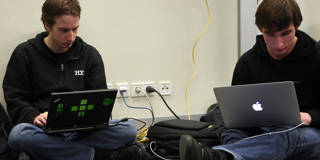Neurologically exceptional people, such as those with autism or Asperger syndrome, tend to be disadvantaged by the traditional interview process. But, if given the opportunity to train and work as cybersecurity professionals, they could prove integral to protecting the data that underpins the digital age.
LONDON – Cybersecurity is one of the defining challenges of the digital age. Everyone, from households to businesses to governments, has a stake in protecting our era’s most valuable commodity: data. The question is how that can be achieved.
The scale of the challenge should not be underestimated. With attackers becoming increasingly nimble and innovative, armed with an increasingly diverse array of weapons, cyber-attacks are happening at a faster pace and with greater sophistication than ever before. The security team of my company, BT, a network operator and Internet service provider, detects 100,000 malware samples every day – that’s more than one per second.
Creative thinking among cyber attackers demands creative thinking among those of us fending them off. Here, the first step is ensuring that there are enough talented and trained individuals engaged in the fight. After all, according to a recent survey by the International Data Corporation, 97% of organizations have concerns about their security skills. By 2022, another study estimates, there will be 1.8 million vacant cybersecurity jobs.

LONDON – Cybersecurity is one of the defining challenges of the digital age. Everyone, from households to businesses to governments, has a stake in protecting our era’s most valuable commodity: data. The question is how that can be achieved.
The scale of the challenge should not be underestimated. With attackers becoming increasingly nimble and innovative, armed with an increasingly diverse array of weapons, cyber-attacks are happening at a faster pace and with greater sophistication than ever before. The security team of my company, BT, a network operator and Internet service provider, detects 100,000 malware samples every day – that’s more than one per second.
Creative thinking among cyber attackers demands creative thinking among those of us fending them off. Here, the first step is ensuring that there are enough talented and trained individuals engaged in the fight. After all, according to a recent survey by the International Data Corporation, 97% of organizations have concerns about their security skills. By 2022, another study estimates, there will be 1.8 million vacant cybersecurity jobs.